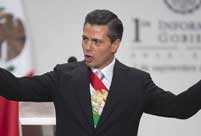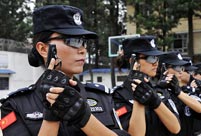 China's new-type guided missile frigate 'Bengbu' in live fire training
China's new-type guided missile frigate 'Bengbu' in live fire training
 China’s weekly story (2013.8.10 - 8.23)
China’s weekly story (2013.8.10 - 8.23)
 Flight team performs first show abroad
Flight team performs first show abroad
 With parents bedridden, 12-year-old boy becomes pillar of the family
With parents bedridden, 12-year-old boy becomes pillar of the family
 Top 10 private Chinese enterprises 2013
Top 10 private Chinese enterprises 2013
 The most gorgeous Chinese women in the eyes of foreigners
The most gorgeous Chinese women in the eyes of foreigners
US Senator John McCain's recent inflammatory remarks in Tokyo calling the Diaoyu Islands Japanese "territory" reflect Washington's irresponsible and provocative Asia-Pacific policy. Despite pro forma statements from Washington about promoting peace and stability in the Asia-Pacific region, critics say Washington's policy may well have the opposite effects. McCain's remarks are a clear indicator of the lack of balance, restraint, and vision in the US Asia-Pacific policy.
In November last year, the US Senate passed unanimously the Webb Amendment to reaffirm US "commitment" to Japan on what was described as the "Senkaku Islands." This biased amendment said the islands are included in the defense perimeter under Article V of the Treaty of Mutual Cooperation and Security between Japan and the US.
By taking this position, the US is not neutral in the Diaoyu issue and risks being drawn unnecessarily into a potential conflict over the islands.
After the WWII, in the prevailing Cold War atmosphere, the US strategic policy was designed to control the "first island chain," which included the Ryukyu Islands, so as to block Soviet Union expansion in East Asia.
In the 1950s, then US secretary of state John Foster Dulles invented the phrase "residual sovereignty" to convey the idea that while the US had conquered various islands and therefore administered them, Washington recognized a supposed underlying Japanese sovereignty. This implied that at some distant future date the US would "return" all the various islands to Japan.
In 1971, the Diaoyu Islands and the Ryukyu Islands were handed to Japan under the Okinawa Reversion Treaty (ORT). In the process of debating the provisions of the ORT in the US Senate, it was clearly seen that the Diaoyu Islands were not Japanese territory but rather a matter of an international legal dispute in which the US was neutral.
But the key point about the inclusion of the islands in US defense commitments with Japan became interpreted in several ways. From the beginning, there was strong opposition to placing them within the defense perimeter of the US-Japan defense treaty. During the Jimmy Carter administration, for example, such opposition included US vice president Walter Mondale.
However, officials at the Department of State and at the Pentagon who were influenced by the pro-Japan Lobby argued for the interpretation that the islands should be included in the defense perimeter. This interpretation vitiates a neutral US stance and the revival of Japanese militarism.
 Mexican president delivers first State of Nation address
Mexican president delivers first State of Nation address Highlights of MAKS 2013 Int'l Aviation and Space Show
Highlights of MAKS 2013 Int'l Aviation and Space Show  10th China-ASEAN Expo opens in Nanning
10th China-ASEAN Expo opens in Nanning Baby born to save his sister - the story of a savior sibling
Baby born to save his sister - the story of a savior sibling Lady of mystery: Female SWAT team in prison disclosed
Lady of mystery: Female SWAT team in prison disclosed  Single mother, baby live in KFC restaurant for months
Single mother, baby live in KFC restaurant for months Fan Bingbing poses for Malaysian magazine Citta Bella
Fan Bingbing poses for Malaysian magazine Citta Bella Zhang Xinyi covers COSMOPOLITAN
Zhang Xinyi covers COSMOPOLITAN A collection of bizarre rooftop buildings around China
A collection of bizarre rooftop buildings around China Putin intimate contacts with marine animals
Putin intimate contacts with marine animals China's frigate 'Bengbu'in fire training
China's frigate 'Bengbu'in fire training Fresh students 'forced' to register in university independently
Fresh students 'forced' to register in university independently 2013 Taiwan Int'l Tourism Expo kicks off in Taipei
2013 Taiwan Int'l Tourism Expo kicks off in Taipei Photo story: Take a gap year
Photo story: Take a gap year Nokia's Global Headquarters: visiting a declining empire
Nokia's Global Headquarters: visiting a declining empireDay|Week|Month